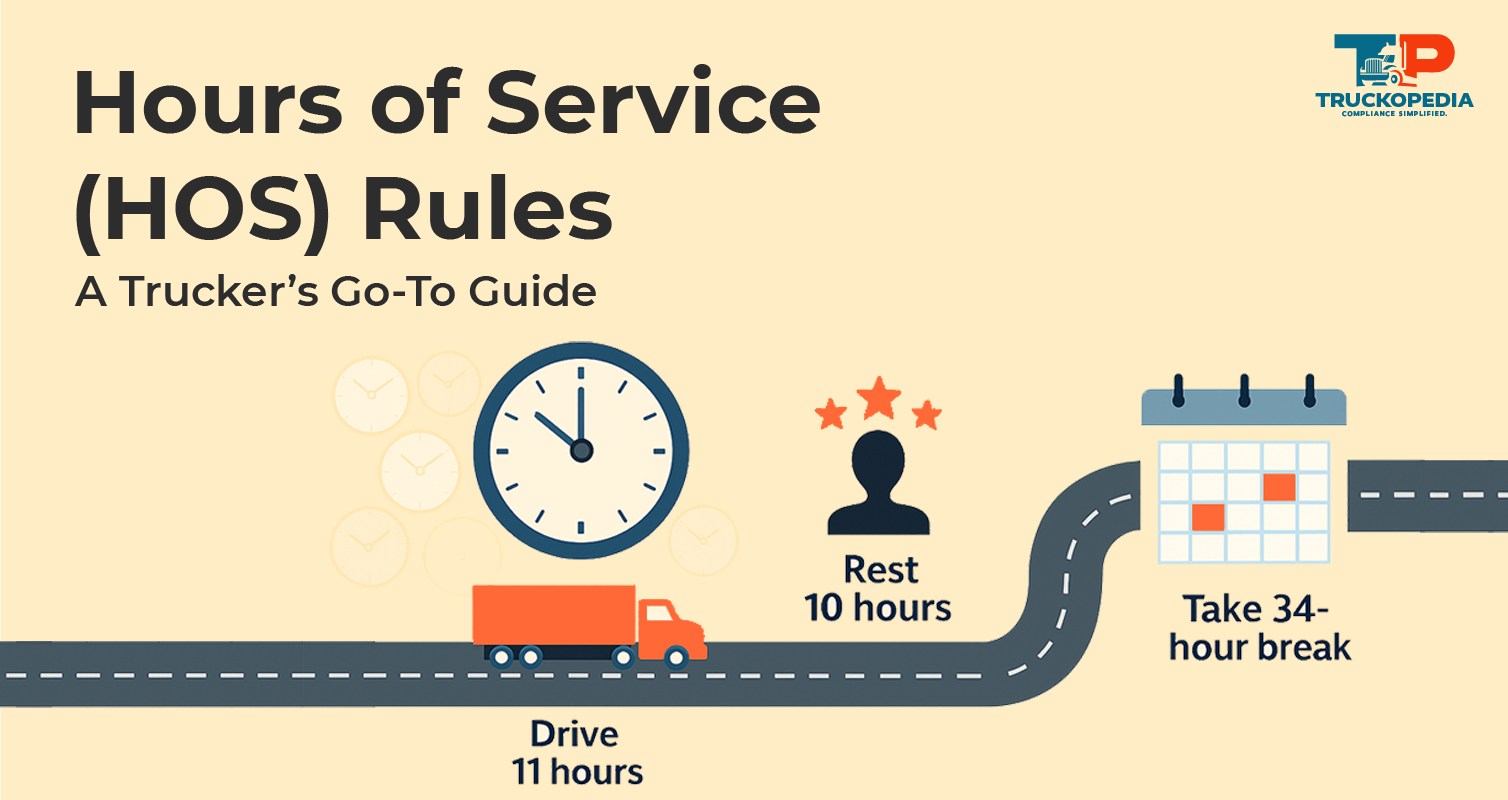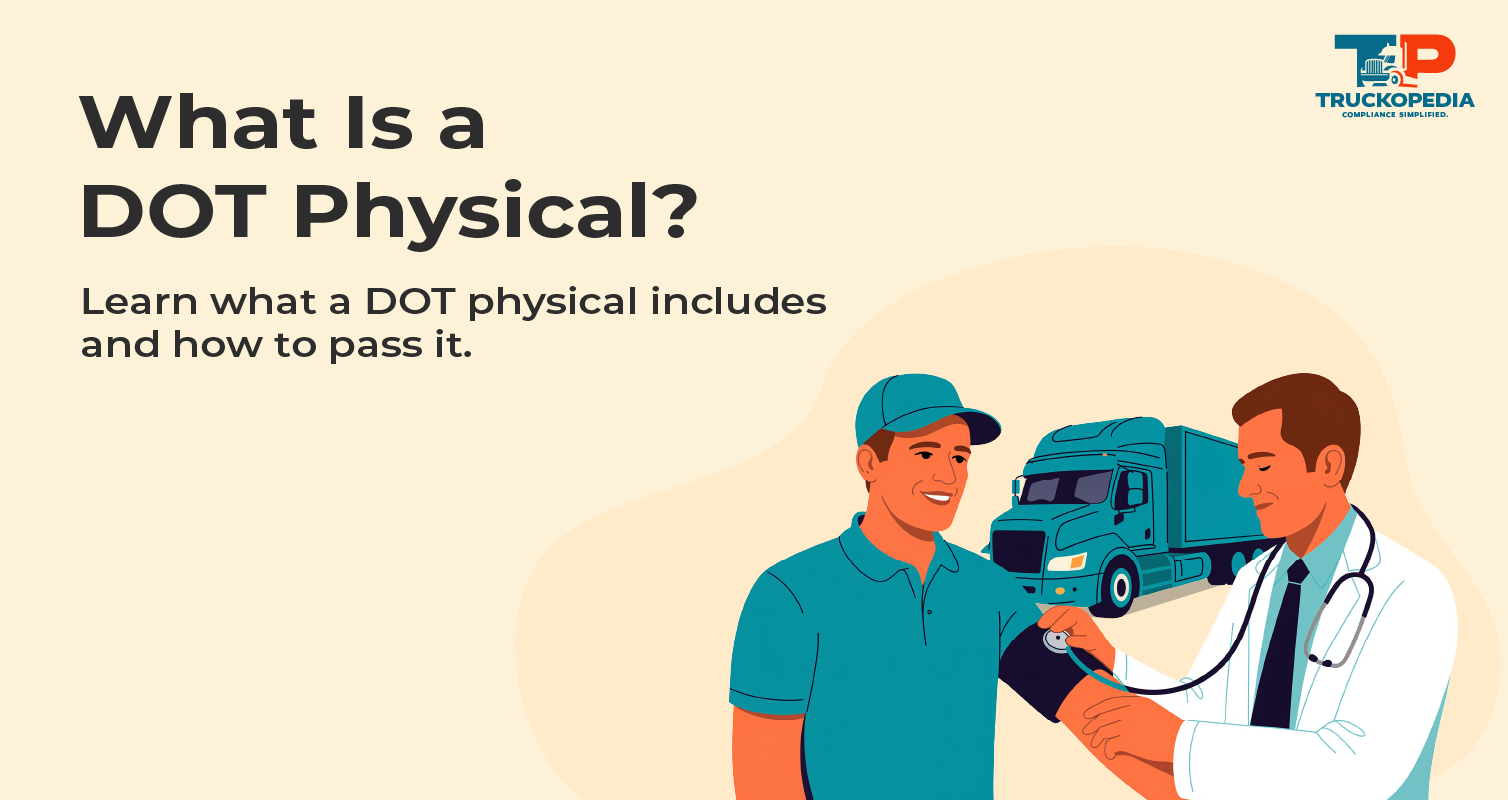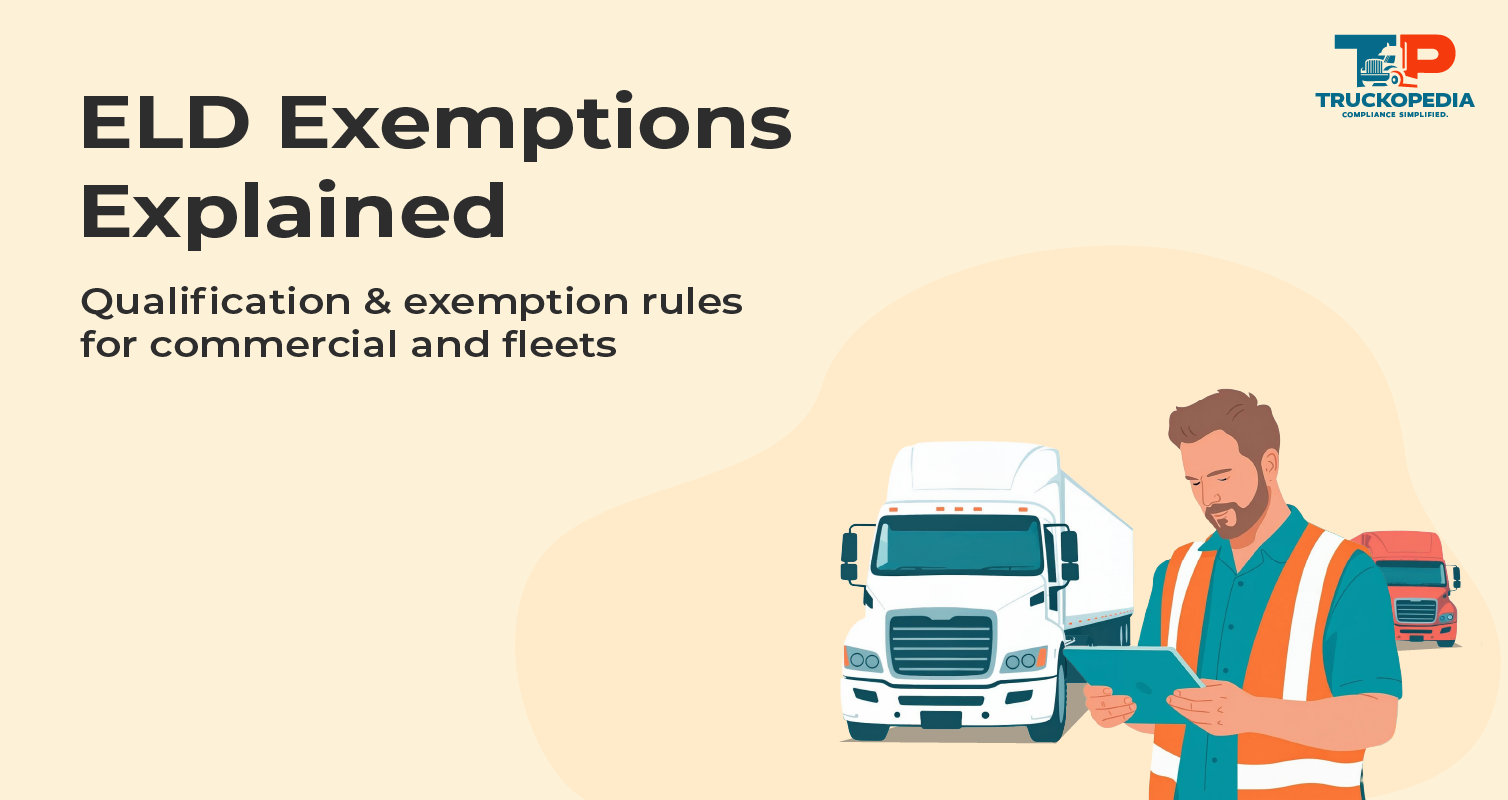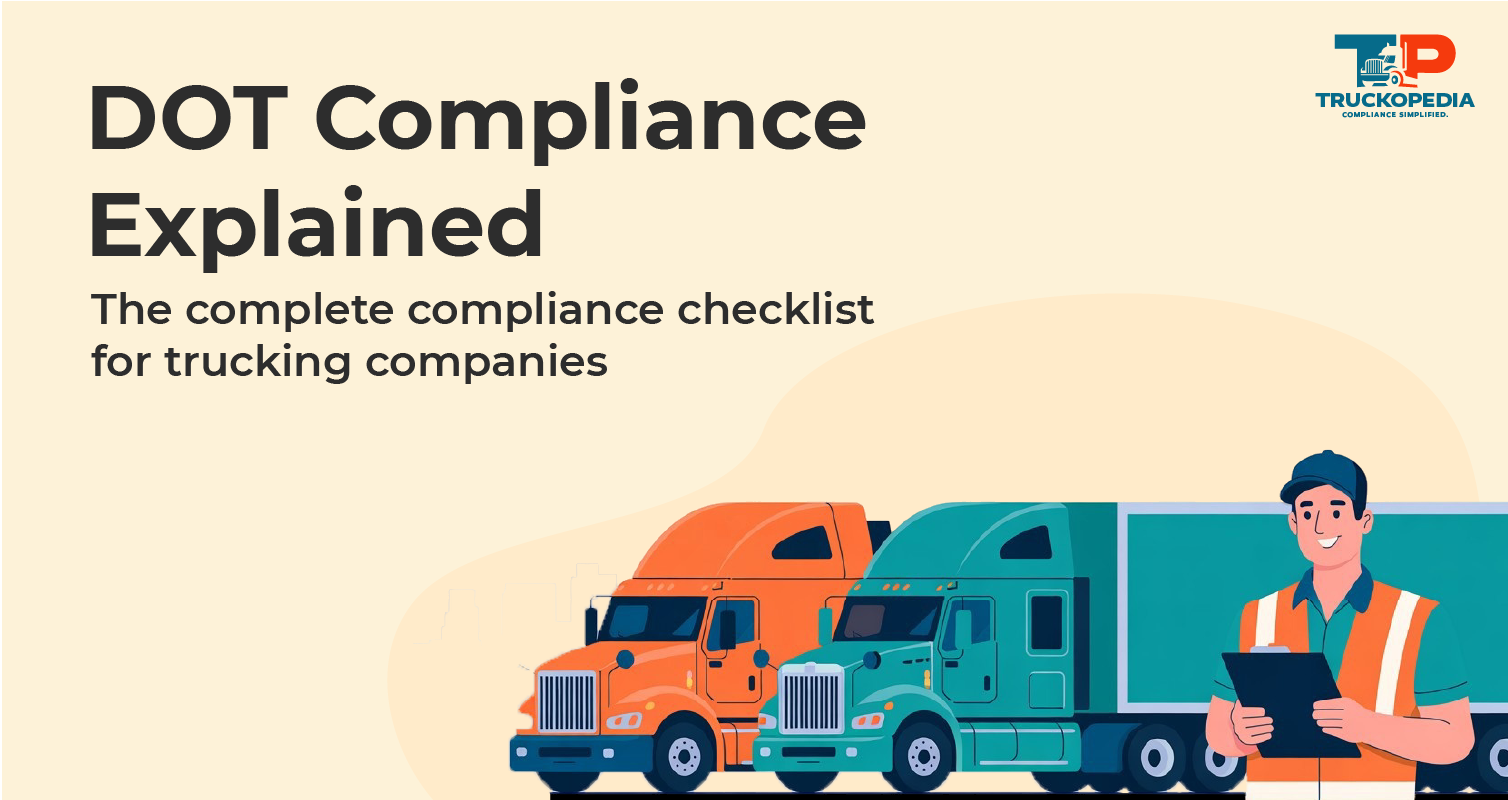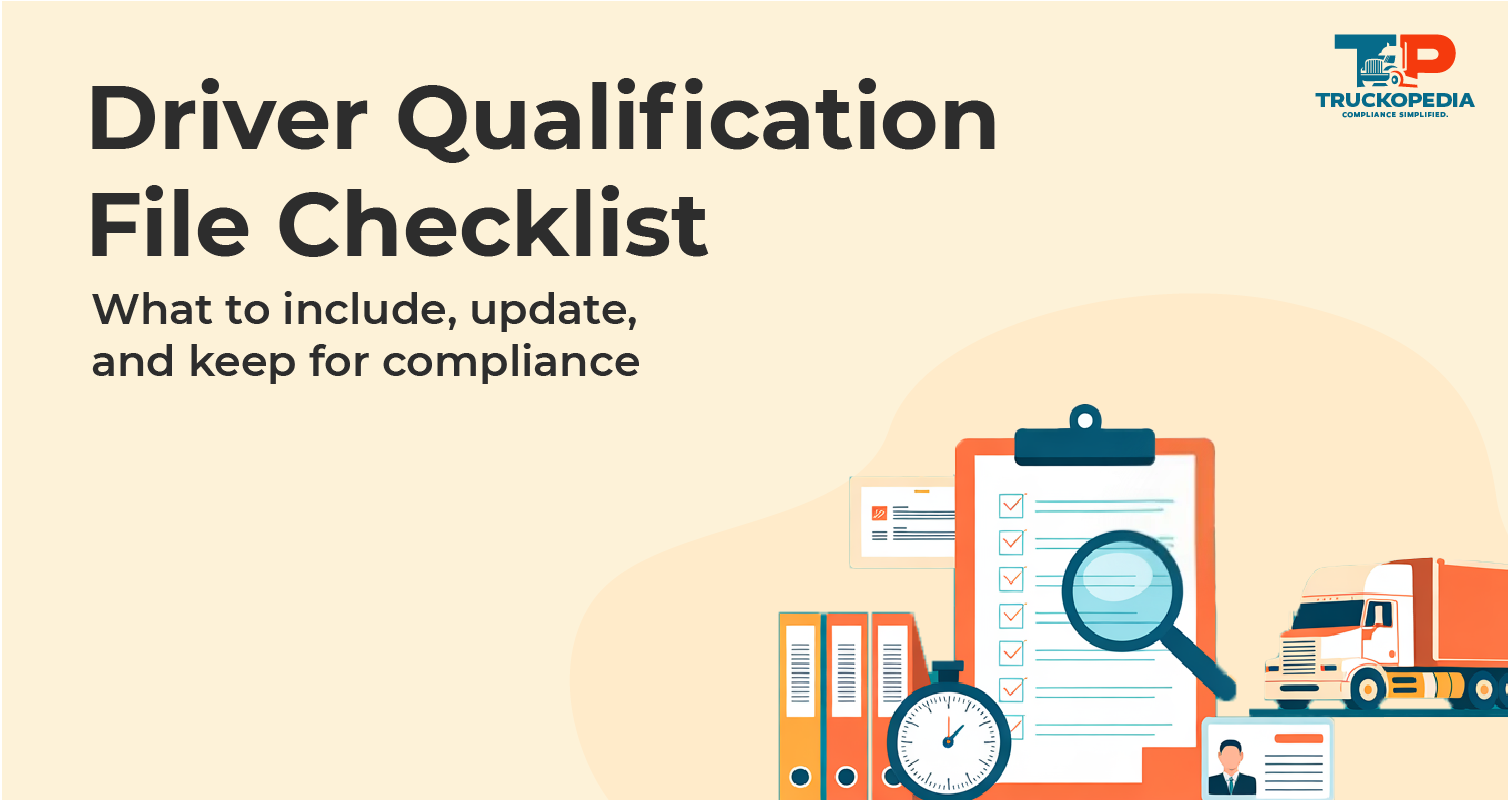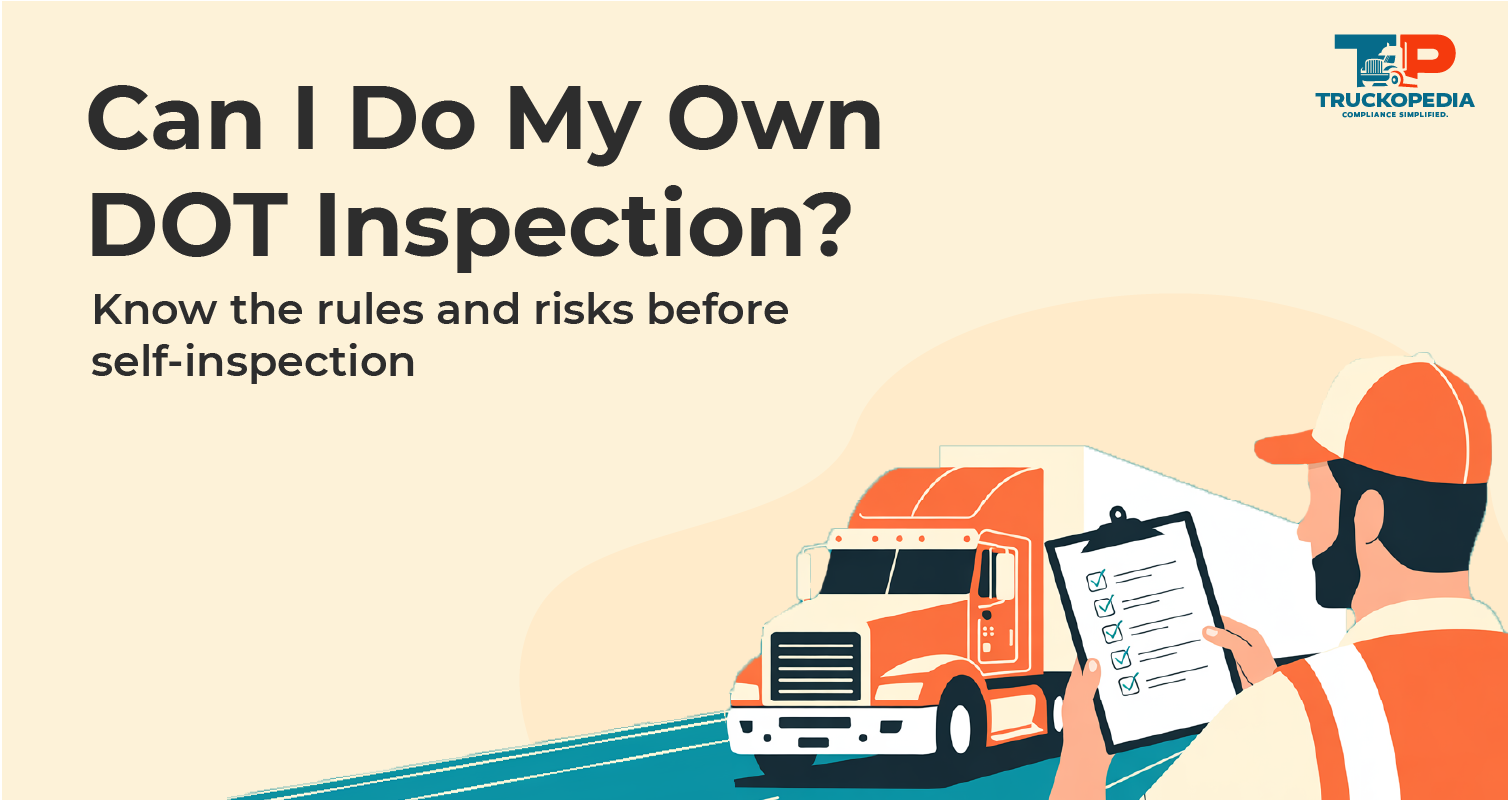A DOT number is required for most commercial motor carriers operating in the United States. However, there are vehicles and businesses that qualify for exemptions. Your DOT exemption depends on several factors, including:
- The type of goods or passengers you transport
- Whether your operations remain within one state (intrastate) or cross state borders (interstate)
- The total weight of your vehicle and its load
The rules around DOT number exemptions can sound confusing at first but once you understand, it’s going to be really easy to maintain compliance with federal regulations. Also, being informed about DOT exemptions helps you avoid violations and costly fines that could reach thousands of dollars. This guide outlines the DOT exemption rules to help drivers and carriers clearly determine when a DOT number is and isn’t required.
What is a DOT number?
A DOT number is a unique identification number assigned by the Federal Motor Carrier Safety Administration (FMCSA) to commercial motor carriers operating in the United States. It serves as a tracking system that records a company’s or vehicle’s safety performance, compliance history, inspections, and crash investigations.
Who needs a DOT number?
A DOT number is required for commercial vehicles operating in interstate commerce, meaning any transportation that crosses state lines. If your business involves carrying passengers, cargo, or hazardous materials across state borders, you must register for and maintain a DOT number without fail:
You also require a DOT number if you are:
- Operating a commercial vehicle with a gross vehicle weight rating (GVWR) or gross combination weight rating (GCWR) of 10,001 pounds or more
- Transporting eight or more passengers for compensation, including the driver
- Transporting 15 or more passengers without compensation, including the driver
- Transporting hazardous materials regulated under 49 U.S.C. Section 5103
Even seemingly small violations, such as carrying a 55-gallon drum of fertilizer in a pickup truck, can fall under hazardous material regulations and require a DOT number. That’s why it’s essential to double check both state and federal regulations to stay compliant and not risk based on assumptions.
What are the exemptions from the DOT number?
Most commercial vehicles in the United States must have a DOT number, but certain operations may be exempt depending on vehicle weight, type of use, and whether the carrier operates across state lines. Common DOT exemptions apply to personal-use vehicles, small vehicles under 10,001 lbs, non-commercial activities, and government-owned vehicles.
Understanding these exemptions helps you avoid unnecessary paperwork and ensures you only register for a DOT number when required. Staying informed also protects you from fines, delays, and compliance issues that can arise from misunderstanding FMCSA rules.
Agricultural operations exemptions
Exemptions for vehicles used in agricultural operations
Some states provide DOT number exemptions for farm vehicles operating intrastate only. These state-level agricultural exemptions are meant to reduce regulatory burdens for farmers and ranchers conducting local farm-related activities. If your vehicle stays within your state, is used primarily for agricultural purposes, and meets your state’s weight and use limits, you may not need a DOT number under state rules.
However, once a farm vehicle crosses state lines or exceeds federal thresholds such as hauling hazardous materials or operating over 10,000 lbs GVWR; federal DOT number requirements apply, regardless of agricultural use.
Conditions under which agricultural vehicles are exempt
To qualify for DOT exemptions, agricultural vehicles must meet the exemption rules set by their state, since FMCSA does not provide a federal DOT number exemption based solely on agricultural use. In most states, agricultural vehicles may be exempt only when the following conditions are met:
- Purpose of use: The vehicle is used to transport farm equipment, supplies, crops, livestock, or other agricultural products to and from the farm.
- Local operation (state dependent): Some states limit their farm-use exemptions to vehicles operating within a defined local radius or within the immediate farming area. These distances vary by state and are not tied to the federal 150 air-mile agricultural HOS rule.
- Operator requirements: The vehicle is owned or operated by a farmer, rancher, or agricultural business for farm-related activities. Commercial transporters hired to move agricultural products generally do not qualify.
- Seasonal use: Some states offer relaxed registration rules for farm vehicles during planting or harvesting seasons, but these policies typically involve state farm tags or temporary permits, not DOT number exemptions as they can still apply if the vehicle crosses state lines or meets federal thresholds.
Examples of agricultural exemptions
- A farmer transporting harvested crops to a local market within the same state as part of routine farm operations.
- Moving farm machinery or equipment between fields or to a nearby repair facility without crossing state lines.
- Transporting livestock locally within the state for normal agricultural activities, as long as the vehicle meets state farm-use exemption rules.
Non-business and personal transportation exemptions
Exemptions for vehicles used in non-business operations
Individuals or entities engaged in personal or non-commercial transportation may be exempt from DOT number requirements. These exemptions apply to vehicles used solely for personal purposes, such as moving your own belongings, recreational activities, or transportation related to charitable or community services. Since these activities are non-commercial, they are not subject to the same regulatory oversight as commercial transportation.
Conditions under which personal or non-business vehicles are exempt
To qualify for a DOT number exemption for personal transportation, the following conditions generally must be met:
- Personal use: The vehicle is used for personal purposes only, not for any business activity. This includes cars, trucks, trailers, or recreational vehicles used for leisure or household moves.
- No compensation: You do not receive payment, reimbursement, or any form of compensation for providing the transportation.
- Ownership of items: The items being transported must belong to you or someone in your household.
If all these conditions are met, the transportation is considered non-commercial and then, a DOT number is typically not required.
Examples of personal transportation exemptions
- Moving your furniture and personal belongings to a new home.
- Towing a camper or boat for a family vacation.
- Helping a friend or family member move their items without charging a fee.
Government agencies
Exemptions applicable to Federal, State, and Local Government vehicles
Certain federal, state, and local government vehicles are exempt from DOT number requirements when used exclusively for official government purposes. These exemptions are designed to allow government agencies to perform essential public services efficiently—such as law enforcement/police units, emergency response, and public works—without being burdened by DOT compliance paperwork. At the same time, the exemptions maintain safety standards for government operations.
Conditions under which Government vehicles are exempted
To qualify for a DOT exemption, government-operated vehicles must meet specific conditions:
- Ownership or operation by a Government entity: The vehicle must be owned, leased, or operated by a federal, state, or local government agency, as well as their subdivisions and agencies. Vehicles owned by private contractors generally do not qualify for the exemption.
- Official Government use only: The vehicle must be used exclusively for official duties. Personal or non-governmental use disqualifies the vehicle from exemption.
- Specialized vehicle considerations: Certain vehicles, such as those transporting hazardous materials, may still be subject to additional FMCSA regulations even if they are government-owned.
- Emergency and Public Works vehicles: Vehicles used for law enforcement, emergency response, road maintenance, sanitation, and other essential public services are exempt as long as they are performing official government functions.
Examples of government exemptions
- A fire truck responding to an emergency within the city.
- A police vehicle used for law enforcement patrols.
- A state-owned DOT truck performing road maintenance.
- A city garbage truck collecting residential waste.
- Ambulances used for emergency response.
Small vehicles and carriers
Exemptions for vehicles under a certain weight threshold
Not all vehicles are required to have a DOT number, especially smaller vehicles and carriers that pose minimal risk to road safety or have a limited impact on interstate commerce. DOT exemptions generally apply to vehicles with a gross vehicle weight rating (GVWR) of 10,000 pounds or less, as long as they operate within one state and do not transport hazardous materials or regulated passengers. These lighter vehicles are often used for local services, small business operations, or personal transport and typically fall outside FMCSA’s DOT registration requirements.
Conditions under which small vehicles and carriers are exempted
A vehicle may qualify for a DOT exemption if it meets the following conditions:
- Gross Vehicle Weight Rating (GVWR): The vehicle has a GVWR of 10,000 pounds or less, including its own weight and cargo.
- Non-hazardous materials: The vehicle does not transport hazardous materials that require federal placarding.
- Passenger and use limits: Some vehicles transporting specific goods are also exempt, as long as they do not exceed weight limits, and fewer than eight passengers, for compensation
- Interstate commerce: Vehicles operating locally and not crossing state lines are typically exempt, easing regulations for small businesses and individual operators.
Examples of small vehicle exemptions
- A local delivery van under 10,000 pounds operating within a single state
- A small landscaping truck transporting equipment and supplies locally
- A community shuttle van carrying fewer than eight passengers
State-specific exemptions
Exemptions based on state-specific regulations
While federal DOT regulations apply nationwide, each U.S. state may have its own rules and exemptions regarding DOT number requirements. This means a vehicle exempt in one state may still require a DOT number in another. Understanding these state-specific regulations is essential for operators to remain compliant when conducting business within state lines.
Examples of state-specific exemptions
State-specific rules can differ significantly. Some states offer more lenient exemptions for certain vehicles or operations, while others enforce stricter requirements. For instance:
- Texas: Some intrastate farm vehicles displaying a valid Farm License Plate may be exempt from needing a USDOT number under Texas rules.
- California: Intrastate CMVs must obtain a CA Number, but strictly non-commercial vehicles do not need a USDOT number.
- New York: Light-duty vehicles under 10,000 lbs GVWR used for personal, non-commercial purposes are exempt from USDOT number requirements.
- Florida: Intrastate carriers operating CMVs over 10,000 lbs must obtain a USDOT number, while personal-use vehicles are exempt.
- Pennsylvania: Certain intrastate farm vehicles operating under specific weight and farm-use categories may be exempt from USDOT number requirements.
- Oregon: Non-commercial personal vehicles do not require a USDOT number when operating intrastate.
These variations highlight the importance of checking local rules before operating commercial vehicles. For example, a small business in Georgia using a light delivery vehicle might qualify for exemptions under state law, but transporting goods across state lines could trigger federal DOT requirements.
Special cases and situations
Exemptions for certain cases and situations
Certain smaller vehicles such as light-duty pickup trucks or service vehicles—may qualify for DOT number exemptions when they operate locally, stay under federal weight thresholds, and do not engage in interstate commerce. These situations reduce the regulatory burden for small business owners and individual operators whose vehicles do not meet FMCSA’s definition of a commercial motor vehicle (CMV). Examples include a landscaping truck operating within one state or a pickup truck used for light, local commercial work that does not trigger federal requirements.
Conditions under which special vehicles are exempted
To qualify for these special exemptions, the following factors are typically considered:
- Type of vehicle and equipment: The vehicle is used for basic service, light deliveries, or similar low-risk commercial activities.
- Operational range: The vehicle operates solely within one state and does not engage in interstate commerce. Crossing state lines disqualifies the exemption.
- Weight and use limits: The vehicle has a GVWR of 10,000 pounds or less and does not transport hazardous materials or more than eight passengers for compensation.
- Non-hazardous cargo: The vehicle carries only non-hazardous materials, since transporting federally regulated hazardous materials requires a DOT number regardless of weight.
Examples of special vehicle exemptions
- A landscaping truck transporting tools and supplies locally within one state.
- A small business owner delivering products with a pickup truck under 10,000 pounds within a 50-mile radius.
- A pickup truck used for personal or light commercial purposes, carrying non-hazardous materials.
How to determine if you qualify for a DOT number exemption?
Figuring out whether your vehicle or operation qualifies for a DOT number exemption can feel overwhelming, but following a clear step-by-step approach makes it manageable.
1. Identify the vehicle’s primary use
Determine the main purpose of the vehicle: business, personal, agricultural, or government use. That primary use narrows which exemption rules might apply.
2. Check vehicle classification and weight
Next, Review your vehicle’s gross vehicle weight rating (GVWR). Vehicles with a GVWR of 10,000 pounds or less are less likely to meet the federal CMV threshold; vehicles 10,001 lbs GVWR (or more) generally require federal DOT registration. Also confirm whether the vehicle meets any state-defined weight categories.
3. Assess your operational range (intrastate vs. interstate)
Determine whether you cross state lines for work. Federal DOT requirements apply if you operate in interstate commerce. If you operate solely within one state, you may still need a USDOT number if your state requires intrastate carriers to register—so this is a state-dependent check, not a federal distance rule.
4. Check hazardous materials and passenger thresholds
If the vehicle transports hazardous materials that require placarding under federal rules, you will generally need a USDOT number regardless of weight or use. Similarly, transporting 8 or more passengers for compensation or 15 or more passengers (including the driver) without compensation can require federal registration, so check these passenger and cargo rules.
4. Review state-specific rules too
Finally, check your state-specific regulations, as some states provide exemptions beyond federal guidelines. Visit your state’s Department of Transportation website to confirm local rules and ensure your vehicle meets all relevant requirements.
By following these steps you can determine whether you need to register for a USDOT number and avoid unnecessary filings or prevent non-compliance if your operation actually meets federal or state thresholds.
Compliance and record-keeping for DOT exemptions
Even if your vehicle or operation is exempt from a DOT number, keeping thorough documentation is crucial. Accurate records—such as mileage logs, transport receipts, and cargo details—demonstrate that your vehicles meet the exemption requirements.
Well-maintained documentation provides a clear paper trail during audits or inspections, allowing authorities to quickly verify compliance. Staying organized and up-to-date with your records helps prevent fines, legal complications, and other regulatory issues, ensuring your operations run smoothly and within federal guidelines.
Wrapping up: Understanding DOT exemptions
Understanding DOT number exemptions is essential for drivers and carriers operating in the United States. By knowing which vehicles and operations qualify for exemptions—whether in agricultural activities, personal transportation, government operations, or small-scale commercial use—transporters can stay compliant while minimizing unnecessary paperwork and regulatory burdens. Properly applying these exemptions helps reduce risks, avoid fines, and ensure smooth, uninterrupted operations. Staying informed about both federal and state-specific rules allows carriers to make smart decisions, maintain safety standards, and operate efficiently in the transportation industry.




